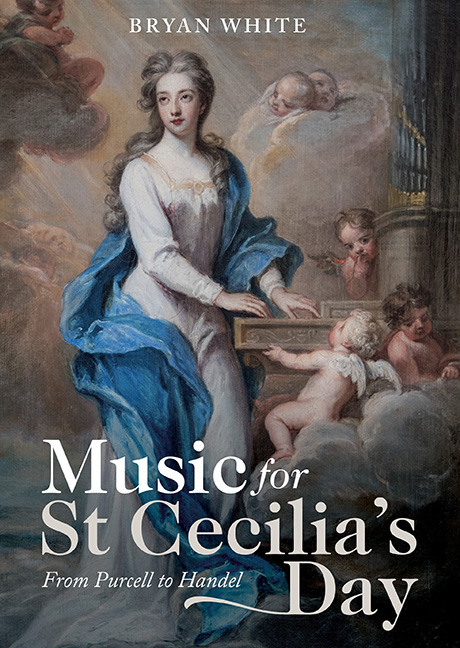Book contents
- Frontmatter
- Dedication
- Contents
- List of Plates, Tables and Music Examples
- Preface and Acknowledgements
- Note to the Reader
- Abbreviations
- Introduction
- 1 The Rise and Fall of the London Cecilian Feasts 1683–1700
- 2 ‘A splendid entertainment’: The Musical Society and the Organization of the Cecilian Feast
- 3 The London Odes 1683–1700
- 4 ‘Church-Musick Vindicated’: Services for St Cecilia's Day
- 5 Provincial Celebrations of St Cecilia's Day
- 6 Cecilian Music in London after 1700
- Bibliography
- Index
- Miscellaneous Endmatter
4 - ‘Church-Musick Vindicated’: Services for St Cecilia's Day
Published online by Cambridge University Press: 13 April 2019
- Frontmatter
- Dedication
- Contents
- List of Plates, Tables and Music Examples
- Preface and Acknowledgements
- Note to the Reader
- Abbreviations
- Introduction
- 1 The Rise and Fall of the London Cecilian Feasts 1683–1700
- 2 ‘A splendid entertainment’: The Musical Society and the Organization of the Cecilian Feast
- 3 The London Odes 1683–1700
- 4 ‘Church-Musick Vindicated’: Services for St Cecilia's Day
- 5 Provincial Celebrations of St Cecilia's Day
- 6 Cecilian Music in London after 1700
- Bibliography
- Index
- Miscellaneous Endmatter
Summary
THOUGH the London Cecilian entertainments began as celebrations of secular music making, they eventually came to make a significant contribution to English sacred music. In 1693 a church service was instituted before the feast at Stationers’ Hall. Held in all years but one at St Bride's Church, Fleet Street, it was the occasion for a sermon in defence of sacred music and performances of elaborate sacred works accompanied by instruments. Among the music composed for the annual service were Te Deum and Jubilate settings by Purcell, Blow and Turner and an elaborate symphony anthem by the latter. All included parts for two trumpets, the first instances of the use of this instrument in English sacred music. These compositions amounted to a nascent series of large-scale sacred works rivalling the secular odes for the feast. The services on St Cecilia's Day provided both a crucial impetus for the reinvigoration of sacred works for voices and instruments and a model for the presentation of sacred music in concert-like performances. In addition to music, the services also featured a sermon, six of which were published. The sermons offer valuable insights into ideas and opinions on the function of sacred music during this period.
Perhaps more surprising than the innovation of the morning service in 1693 is the fact that the Musical Society had observed its annual celebration for a decade without one. After 1683 the Cecilian feast came to resemble contemporary county feasts. These events were commonly preceded by a church service with a sermon, which the county association hosting the event often printed. Though there is no direct evidence to explain why the Musical Society chose not to hold a service for the first ten years of its annual feast, reluctance on the part of clergymen to give a sermon for an event that may have been seen to have Roman Catholic associations offers a plausible explanation. Particularly after James II took the throne in 1685, Anglican divines sensitive to the king's promotion of measures that condoned Catholics and Catholic worship may have seen in the linking of a church service with the celebration of a saint the potential to misconstrue the event as papist. Furthermore, one of the main preoccupations of the extant sermons delivered on St Cecilia's Day, defence of the use of music in the church, and especially instrumentally accompanied music, was not at issue before 1689.
- Type
- Chapter
- Information
- Music for St Cecilia's Day: From Purcell to Handel , pp. 168 - 218Publisher: Boydell & BrewerPrint publication year: 2019

